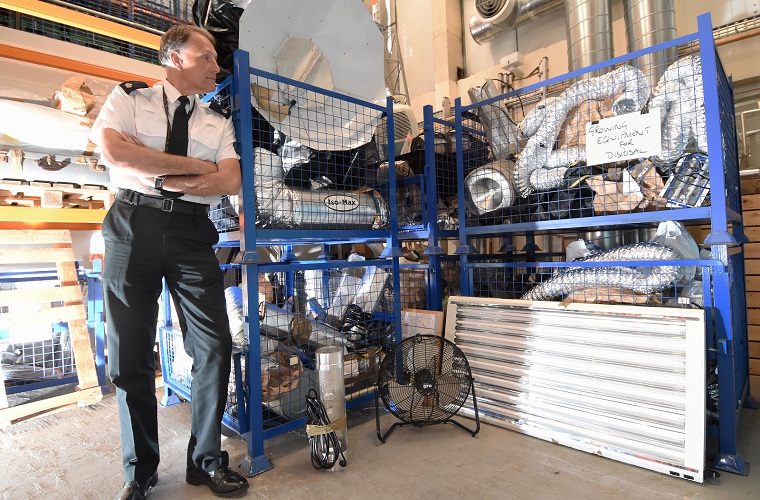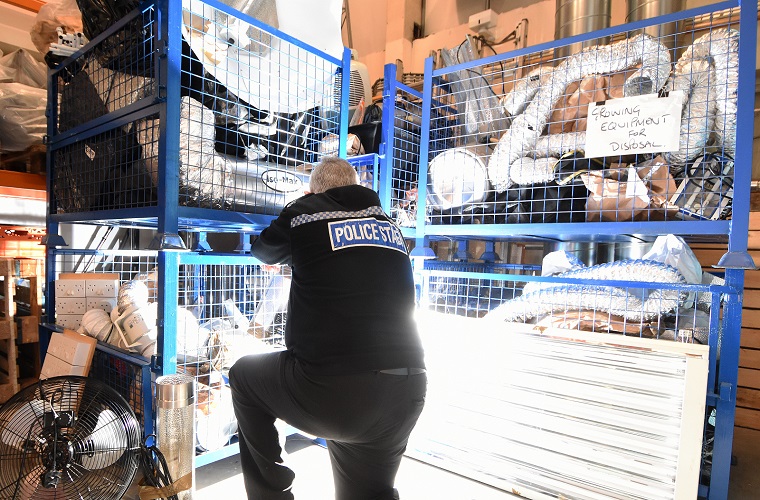Recycling Hydroponic Equipment
If you would like to register an interest in working with BEES UK, then please send us an email via the Contact Page
From cannabis to carrots: new project launched to recycle hydroponic equipment for school growing initiatives
Hydroponic equipment confiscated from criminal drugs operations is to be repurposed for organic food growing projects in schools thanks to a ground-breaking new agreement.
Educational social enterprise, Bespoke Engaging Education Services (BEES UK) is partnering with Devon and Cornwall Police to take the systems into schools across the region and train staff and students to create super-efficient food growing projects cleverly integrated into the curriculum.
Hydroponics is the method of growing plants without soil, using mineral nutrient solutions. It is a technique sometimes employed in the production of cannabis, and in such cases, when the systems are seized by police they have to be destroyed at public expense.
But following discussions between BEES UK and police representatives, a new project has been launched to recycle the equipment for schools, creating aquaponics systems, where the vital nutrients are provided by resident fish through their waste products. BEES UK want to spread the word to schools across the region. “The long-term dream is to see every school engaging in food growing initiatives helping promote healthier lifestyles and nutrition awareness”.
“We’re taking equipment that has been used in the commission of illegal drugs production and repurposing it for positive educational and, potentially, nutritional benefit,” said Nathan Potts, Director of BEES UK. “Aquaponics is a near effortless, self-sustaining method of growing produce, where the fish and the plants form a natural symbiosis. It means low maintenance for the schools, and the pupils have the added engagement of being able to study the fish.”
Devon and Cornwall Police confiscate on average X units per year and are required to dismantle them once any criminal legal proceedings are completed.
Superintendent Craig Downham is responsible for local policing and partnerships at Plymouth BCU. He said: “Devon and Cornwall Police prefer not to send items, which still have a useful purpose, to landfill. Specialist waste, such as that found in hydroponic equipment, costs us a considerable amount of money to dispose of. So, this is a win-win situation, putting the equipment to good use and saving public money. We have good working relationships with many charities donating items such as bikes, clothing, foodstuffs and saleable goods.”
BEES UK specialises in working with schools on co-curricular projects, such as outdoors learning, animal husbandry and organic food production. It also works with young people who are struggling to engage with traditional classroom-based education.
Nathan says the aquaponics project is a natural extension of BEES’ work and has the potential to be rolled out to other areas of the country and to a wide range of institutions. The team has already developed learning resources and plans for schools that want to install the technology, including appointing student ‘aqua ambassadors’ to encourage peer learning.
“At a time when one in five children under the age of 15 suffers from food insecurity in UK, engaging schools with growing projects like this can only be a good thing for societal wellbeing,” Nathan said. “And while the students are learning and nurturing their understanding of the environment, the organic veg they produce can potentially help the school to cut procurement costs and reduce its carbon footprint.”
BEES is now looking to work with a landowner in Devon or Cornwall to establish a demonstration site that could be visited by schools interested in using the aquaponic and hydroponic systems. And in showcasing the technology, Nathan says there is also the potential for such a site to become a self-sustaining venture, producing organic fruit and vegetables for the local community.
“When many people hear the word ‘hydroponic’ they automatically think of drugs,” Nathan adds. “And that is unfortunate, because it really does offer a sustainable method of growing high-quality organic produce, that reduces food miles, and provides opportunities for community engagement. Hopefully this project will help us to ‘reclaim’ the word for positive reasons.”



